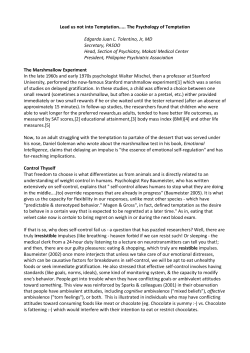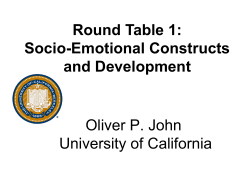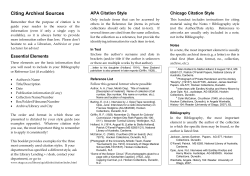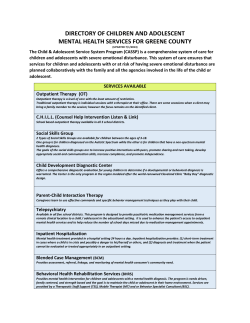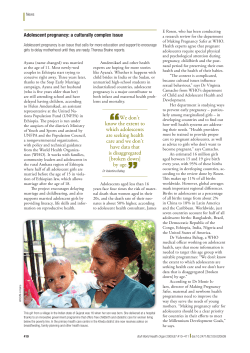
What is important in the early years
What is important in the early years and how should curricula reflect that? Professor Richie Poulton Director, Dunedin Multidisciplinary Health and Development Research Unit; Co-Director, National Centre for Lifecourse Research Department of Preventive & Social Medicine Dunedin School of Medicine University of Otago Dunedin, New Zealand Outline ➤ Why self-control? The Dunedin Study Predicting adult outcomes Adolescent mistakes Isolating self-control as an active ingredient Costs to society Implications What is Self-control? Self-control is the ability to regulate one’s emotions, desires, and behaviors in the service of later rewards. Think before you speak or act Resist temptations Give considered response instead of an impulsive one Resist saying something inappropriate (or hurtful) Resist ‘tit for tat’ (hurting someone because that person hurt you) Resist jumping to conclusions Self-control: Studied by all behavioral sciences PERSONALITY PSYCHOLOGY Conscientiousness, impulsivity CHILD PSYCHOLOGY Delay of gratification, difficult temperament ECONOMICS Inter-temporal choice, reward discounting NEUROSCIENCE Executive function PSYCHIATRY Inattention-hyperactivity MANAGEMENT SCIENCE Will power, self-discipline Why Study Self-control? Childhood self-control predicts success and failure in adult life, above and beyond intelligence and family wealth Self-control: More necessary today than it used to be? AVOID OBESITY in an era of ready food availability MAINTAIN FITNESS in an era of sedentary jobs SUSTAIN MARRIAGES in an era of easy divorce PREVENT ADDICTION in an era of access to substances RESIST SPENDING in an era of sophisticated marketing SAVE FOR OLD AGE in an era without guaranteed pensions Outline ➤ Why self-control? The Dunedin Study Predicting adult outcomes Adolescent mistakes Isolating self-control as an active ingredient Costs to society Implications Retention in the Dunedin Study Age Year Number Percent* Birth 3 5 7 9 11 13 15 18 21 26 32 38 1972-73 1975-76 1977-78 1979-80 1981-82 1983-84 1985-86 1987-88 1990-91 1993-94 1998-99 2004-05 2010-12 1037 991 954 955 925 850 976 993 992 980 972 961 100% 96% 92% 92% 90% 82% 95% 97% 97% 96% 96% 95% * Percentage seen of those who were eligible (i.e. alive) at each age Measuring Childhood Self-control Predictor: A composite of ratings Persists across ages 3, 5, 7, 9, 11 years Agreed upon by multiple reporters Staff observations of child’s self-control in the clinic Parents’ reports 4 different teachers’ reports Child’s self-reports Impulsive, acts without thinking. Can’t wait his or her turn. Low frustration tolerance. Dislikes effortful tasks. Fleeting attention, easily distracted. Lacks persistence, easily forgets goals. Often goes for the risky thing. Requires constant attention and motivation from an adult. Outline ➤ Why self-control? The Dunedin Study Predicting adult outcomes Adolescent mistakes Isolating self-control as an active ingredient Costs to society Implications Cardiovascular fitness Anthropometrics Cardiovascular health Blood pressure Lung function Dental examination Laboratory tests (cholesterol, inflammation, sexually transmitted infections, etc.) Health Outcomes: A count of clinical measures in adulthood Cluster of metabolic abnormalities (17%) - E.g., obesity, blood pressure, cholesterol Periodontal disease (20%) Sexually-transmitted infection serology (18%) Inflammation biomarkers abnormal (20%) Respiratory airflow obstruction (17%) Retinal vasculature imaging Personal Interviews (drug and alcohol dependence or addictions) Health Outcomes: DSM-IV substance dependence diagnoses in adulthood Tobacco dependence (19%) Alcohol dependence (8%) Cannabis dependence (5%) Harder Drug dependence (3%) Corroborated by informant reports Adult wealth outcomes in adulthood Income in NZ dollars Occupational prestige Financial planfulness in adulthood Attitudes toward saving and saving behavior Financial building blocks e.g., − Is saving for the future important to you? e.g., − Home ownership − Do you save money by putting money away and not touching it? − Investments − Retirement plan Financial struggles in adulthood: self & informant reports Money-management difficulties Credit problems e.g., − Do you find it difficult to meet the cost of… • Rent, mortgage e.g., − Turned down for a credit card • Phone or heating bills − Sold belongings to a pawnbroker • Major repairs to car or house − Declared bankrupt • Do you find yourself living paycheck to paycheck? Criminal court convictions, age 18 to adulthood New Zealand and Australian Police All analyses shown today controlled for four main alternative explanations… Gradients looked the same in − Children from high-income families − Children with above-average IQ − Girls − Children without ADHD diagnoses Outline ➤ Why self-control? The Dunedin Study Predicting adult outcomes Adolescent mistakes Isolating self-control as an active ingredient Costs to society Implications Getting trapped by adolescent mistakes: Children with low self-control were more likely to make mistakes as teens… In the “utopian” subsample of the cohort who as teens… did not smoke did not drop out of high school did not have an unplanned baby Outline ➤ Why self-control? The Dunedin Study Predicting adult outcomes Adolescent mistakes Isolating self-control as an active ingredient Costs to society Implications The Environmental Risk (E-Risk) Longitudinal Twin Study 1994-95 birth cohort 2,232 twins Nationally representative 50% DZ-MZ Birth, 5, 7, 10, 12, 18 years 96% retention Moffitt et al., (2002) J. Child Psychology and Psychiatry Self-control at age 5 years Impulsive, acts without thinking. Can’t wait his or her turn. Low frustration tolerance. Dislikes effortful tasks. Fleeting attention, easily distracted. Lacks persistence, easily forgets goals. Often goes for the risky thing. Requires constant attention and motivation from an adult. Outline ➤ Why self-control? The Dunedin Study Predicting adult outcomes Adolescent mistakes Isolating self-control as an active ingredient Costs to society Implications When the E-Risk children were 12 years old, We asked their teachers: Compared to classmates, how often… Must you act to keep this child’s attention on task? Must you act to curb disruptive behavior by this child? Does this child’s behavior make it frustrating to work with him/her? Does this child need one-to-one interaction from you? Must you give this child extra encouragement to get him/her to take part? Houts, Moffitt, et al., (2010) Psychological Science Welfare-benefit use records are from the New Zealand Ministry of Social Development But are they happy? Are people with very high self-control less satisfied with life? Outline ➤ Why self-control? The Dunedin Study Predicting adult outcomes Adolescent mistakes Isolating self-control as an active ingredient Costs to society Implications Multiple outcomes: Implications Enhancing self-control might reduce costs of… − crime control − health care − social welfare − a healthy and financially secure old age − improve the life chances of the next generation Moffitt, Caspi et al. Proceedings of the National Academy of Sciences (2011) Childhood vs. adolescence: Implications Preventing adolescent mistakes is not enough to eliminate the gradient of life success Consequences of self-control start accumulating from early childhood Early intervention for best cost/benefit ratio The self-control gradient: implications Targeted vs. universal intervention? Even children above average on self-control can benefit from better selfcontrol skills Even intelligent children from well-to-do homes can benefit from better self-control skills The gradient implies universal enhancement Teaching SAVING teaches SELF-CONTROL www.sesamestreet.org/parents/topicsandactivities/toolkits/save Is it time for modern nations to teach self-control skills to all children? Acknowledgements • This on-going research would not have been possible without the co-operation and commitment of the Study members, their families and friends over a long period of time. • Core funding for the Dunedin Multidisciplinary Health and Development Research Unit comes from the Health Research Council of New Zealand. For copies of research articles referred to in this presentation or other information on the Study, contact Michelle McCann: +64 3 479-8507 email: dmhdru@otago.ac.nz http://www.otago.ac.nz/dunedin study To make sure programs work, we need to answer 3 hard questions…… Is the program effective under real-world conditions? Does learning self-control in one setting generalize to other settings? Is self-control like plastic, or is it elastic?
© Copyright 2025
